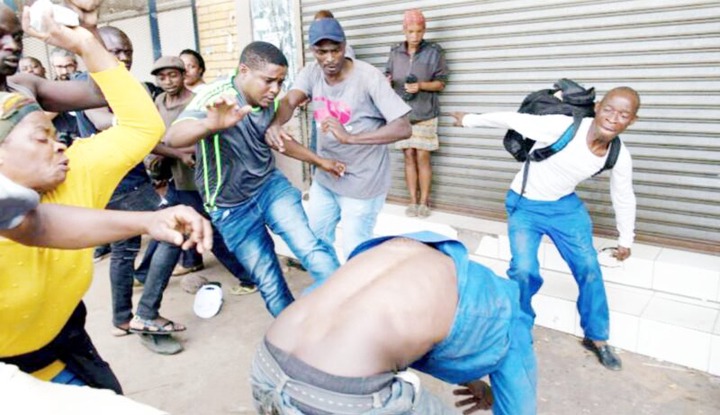Tola Shoile endures Johannesburg like a mental wound. Twelve years after he relocated to the South African capital to make ends meet, the city seems poised to end him.. . Continue..Reading. .
“Jo’burg has taken too much from me. It cost me my business and bankrupted me. I lost everything in the xenophobic attacks of 2022,” he said, recalling how two members of his staff led an assault on his auto dealership in Cleveland, Johannesburg. Click link to continue reading.
Shoile disclosed that it took him a long while to recover from the shock of the betrayal. “I was very good to them. And I gave them bonuses even when they hadn’t earned it. Yet, they led a mob to burn down my shop. They burnt about 50 cars,” he said. “They accused me of taking their jobs but how is that possible when all I did was provide them employment? Now, they have started again,” said Shoile, bemoaning the recent wave of xenophobic attacks spearheaded by the Operation Dudula movement.
Shoile’s fears are accentuated by the sad fate of fellow migrant, Ifeanyi Obi. Few months ago, Obi encountered terror in common hours. The 41-year-old had gone to the Jeppe Clinic with his wife and daughter for a post-natal check-up. While in the clinic, he stepped outside to “receive a package” from a client with whom he had previously fixed a meeting.
“On my way out, I saw a crowd assembling at the hospital entrance and I suspected that it was the Dudula gang. But I had to get the cash from my client. I discharged him immediately and
returned to get my wife,” he said.

But as he approached the clinic, Obi saw that the crowd, previously scattered and ragtag, had coalesced into an organised mob: men and women from Operation Dudula milled around the hospital chanting “Foreigners must go!”
As tensions intensified, the mob prevented Obi and a few others trying to access the clinic. To their chagrin, security personnel watched unperturbed as mothers with babies and other patients identified as foreigners were shoved back into the street.
A section of the mob surged towards him and Obi scampered to safety. From a distance, he craned his neck to see if his wife, Bridgette, would emerge with their daughter pressed safely to her chest. But she didn’t.
“I went back later, after the mob dispersed, but I couldn’t find them. I dialled her number unsuccessfully and called our friends but none of them had seen her. I was so scared,” he said.
Bridgette would later reach out to him from the outskirts of Johannesburg via a terse message. “I am at my cousin’s,” she said. She subsequently called him at midnight to tell him that: “A man like you stayed back to help me.” Since then, they have been estranged from each other.
The Obis represent a fragment of a wider migrant community afflicted by South Africa’s xenophobic rage. Across Johannesburg’s inner-city tenements and the scattered townships of Gauteng, several migrant families, grapple with the consequences of xenophobia and other forms of anti-immigrant hysteria. Husbands vanish in street attacks and wives retreat to safer districts or back across the continent.
For Rotimi Adegboye, the experience has been both “good and bad.” According to the 48-year-old, who hails from the Omowumi Abisogun Royal Family of the Iru/Ilashe kingdom in Eti-Osa area of Lagos State, since he relocated to South Africa in 2006, he has met with lots of wonderful South Africans who accepted and befriended him without discrimination.
“On the other hand, I met with some South Africans that get intimidated because I am Nigerian. These ones attack you verbally, directly and indirectly, labelling you a drug mule or a scammer,” said Adegboye, adding that he has never suffered any grievous xenophobic attack.
Yet, Oyindalopo Muyiwa, 46, recalled how her Zimbabwean neighbour was hacked in broad daylight, and the night a Malawian acquaintance’s cries carried through the alley as he was burned to death by people who used to be their neighbours.
She subsequently relocated from her “toxic neighbourhood in central Joburg” to the northern part of the city, and subsequently, “a more friendly environment in Ontario, Canada.”
South Africa, according to Muyiwa, is fast becoming a graveyard for African migrants and she didn’t wish to become a random casualty of xenophobic attacks by natives who think of immigrants as criminals and social parasites stealing their jobs and medicines.
The hospital, internet as battlefield
Through it all, the Operation Dudula movement has found a new stage for its campaign of erasure: the public health system. Hospitals and clinics, once sanctuaries for healing have been turned into scenes of exclusion. Recent viral videos circulating online, show men and women storming waiting halls and commanding patients to stand if they are foreign, demanding proof of their citizenship before they are allowed access to treatment.
“If you know yourself that you are not a South African, please stand up,” one Dudula leader barked menacingly at the Roodepoort Clinic. “Don’t try us. We will check everybody.”
The viral video of a defiant Nigerian woman being chased from a South African clinic and the euphoric approval by South Africans of the treatment meted to her further accentuates the wider climate of anti-Nigerian sentiment that has long simmered in the country’s streets and now thrives in its digital commons.
Clutching her infant daughter in one arm and medical documents in the other, she dared her assailants to assault her even as she hurriedly left the hospital – without seeing the doctor – for her safety and that of her child.
But rather than show compassion for mother and child, most South Africans on the comment thread attacked her.
“Her bold attitude would have helped her in Nigeria, but no, she chose to come to SA to fight for her wrongs,” wrote @andiswatembela4942. His words setting the tone for many others who framed the woman’s presence in the hospital as an unwelcome intrusion.
@NtombiMaseko-m7d was blunt: “Let them go,” and @PenelopeNgqumaza insisted, “Go and shout in your country.”
The repeated use of “makwerekwere,” a slur for foreign nationals, underscores hostility. “Makwerekwere hasihambeni,” posted @LinaAkokwa. “Hambani makwerekwere,” echoed @sisterashericharmaine1602.
For many, Operation Dudula embodies patriotic action. “Viva Dudula and March on March,” declared @thabojosepgsekhabisa9593, while @LizaMashaba celebrated: “Viva Dudula viva.”
@BulelwaMatiwana-q9k added, “Thanks, viva Dudula vivac,” and @mrscashqueenb8855 endorsed the group’s stance: “They are doing a great job… even in Nigeria there is no free clinic and hospital.”
Beyond nationality, some reduced the woman to a caricature. “They always shout. Fighting. Imagine this Nigerian oooo,” wrote @PenelopeNgqumaza. While others framed her “boldness” as arrogance. For @andiswatembela4942, her assertiveness was evidence that she didn’t belong.
The stereotype of Nigerians as combative, disorderly, and unwilling to assimilate saturates the views while the struggle over scarce resources was a recurring theme.
“There is a Nigerian who was talking on TikTok who said they have free hospitals in Nigeria lol, so my question is why they come to SA manje?” asked @triston9618.
“Why would you have multiple children in a country you are not familiar with and you weren’t born in?” questioned @NomalwandleNdlovu, who acknowledged trauma for the woman’s children but still placed blame on her choices.
The rhetoric sometimes turns chilling. “Uyazi lezizinja zama Nigeria kumele kezifundiswe isifundo,” posted @MarrySithole, adding that “These Nigerian dogs must be taught a lesson.”
Yet amid the hostility, a few commenters pushed back. “This aggression of yours bro, is not necessary,” countered @rejoicevuragu651.
“It’s painful though,” admitted @phumilushaba4892. “Chasing poor women and children is wrong,” said @PaulineVeremu.
@brewedcoffee727 struggled with ambivalence: “This feels harsh and it’s pulling on my heart strings… painful to watch. But it has to be done… there needs to be order.”
A broader reflection came from @TinasheManuel: “South Africa is isolating itself from a future that is united.”
Some redirected their frustration toward the South African government. “Ma South Africans, let’s fast move this issue yamakwerekwere, so we can proceed to fight this Cape Independence. The country is going thanks to ANC & DA,” posted @ndukhumalo7794.
The hostile commentaries illustrate how Nigerians are perceived as invaders by members of their South African host communities. The widespread support for the Operation Dudula shows how the sentiment is deeply entrenched in everyday discourse. While a handful of voices call for empathy, they are drowned out buy a swell of resentment.
Nigerians on the receiving end…
Few Nigerians will forget in a hurry, the South African assault on immigrants, in 2019. The attack started from the suburbs of Johannesburg on Sunday, September 1, 2019.
By Monday, September 2, South African men and women wielding clubs and stones were marching through the central business district chanting war songs. In the melee, they looted and burned more than 70 businesses owned by Nigerians, Zimbabweans, Mozambicans, among others, to the ground.
In the wake of a previous attack few months earlier, precisely July 2019, the then President of the Nigerian Senate, Ahmed Lawan, condemned the persistent attacks and killings of Nigerians in South Africa, warning that further attacks won’t be tolerated.
Lawan, who hosted the South African High Commissioner to Nigeria, Bobby Moroe, said at least 118 Nigerians had lost their lives in xenophobic violence over the years, including 13 allegedly killed by the South African police.
“These killings must stop,” the Senate President said even as he cautioned that the circulation of graphic images of victims on social media could spark reprisals beyond the control of government, urging the South African leadership to urgently protect Nigerians living in the country.
Lawan recalled Nigeria’s role in South Africa’s anti-apartheid struggle, stressing that it was unacceptable for Nigerians to continue to die violently in South Africa given their history of helping the country in its time of need.

Nigeria repatriated more than 600 citizens from South Africa following the spate of deadly xenophobic attacks that left at least 12 people dead and scores of businesses destroyed.
The violence, which erupted in Johannesburg and Pretoria, targeted nearly 1,000 foreign-owned businesses and drew international condemnation.
Predictably, the attacks strained relations between Nigeria and South Africa, triggering diplomatic protests and calls across Africa for boycotts of South African interests.
In his remarks, Moroe expressed regret over the killings and conveyed his government’s condolences to the families of the victims. He said an inquest had been launched to investigate the xenophobic attacks and identify lasting solutions.
“Our government will continue to be committed to the good relationship with Nigeria,” Moroe said. “On behalf of the government of South Africa, we express our sincere condolences to the Nigerian government for this unfortunate incident.”
Yet, that grisly history is about to repeat. Against the backdrop of Operation Dudula’s campaign, the anti-immigrant rhetoric escalates like wildfire, threatening to ignite classrooms as it has ignited clinics.
From public officers to private citizens, many South Africans have lent legitimacy to the brewing xenophobic fervour. Some accuse migrants of turning Johannesburg into a “banana republic.” Others blame them for medicine shortages, crime surges, and even the instability of the state itself.
Evidently, their words are tinder, Dudula simply strikes the match.If You’re Reading From Phoenix Click On Read Original at the top To Read Full Article




